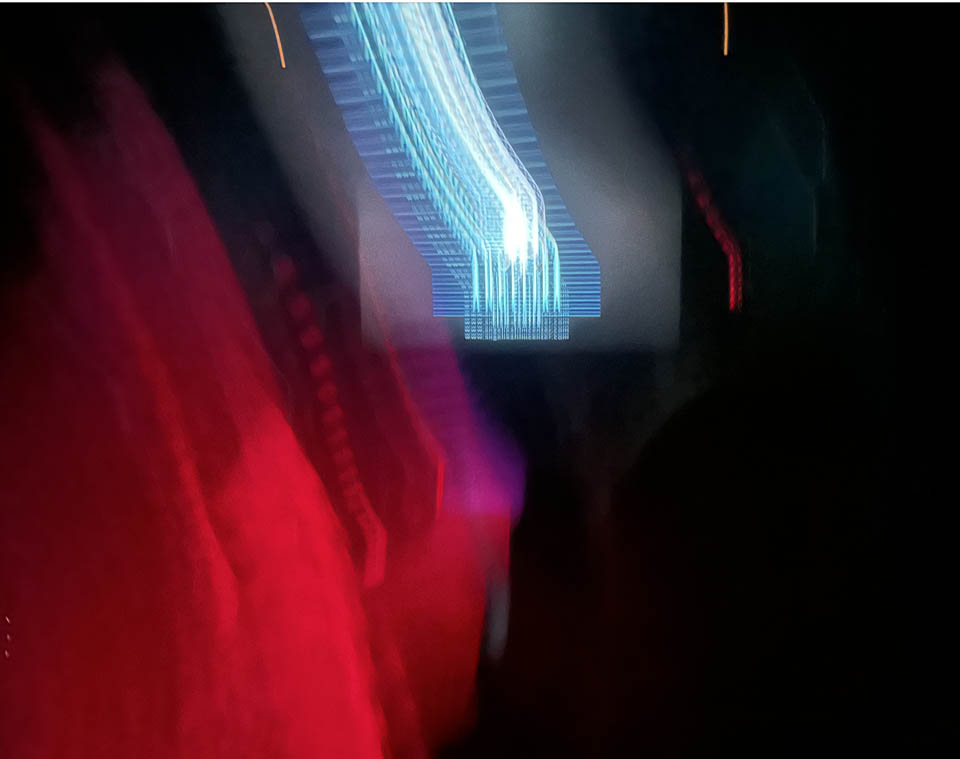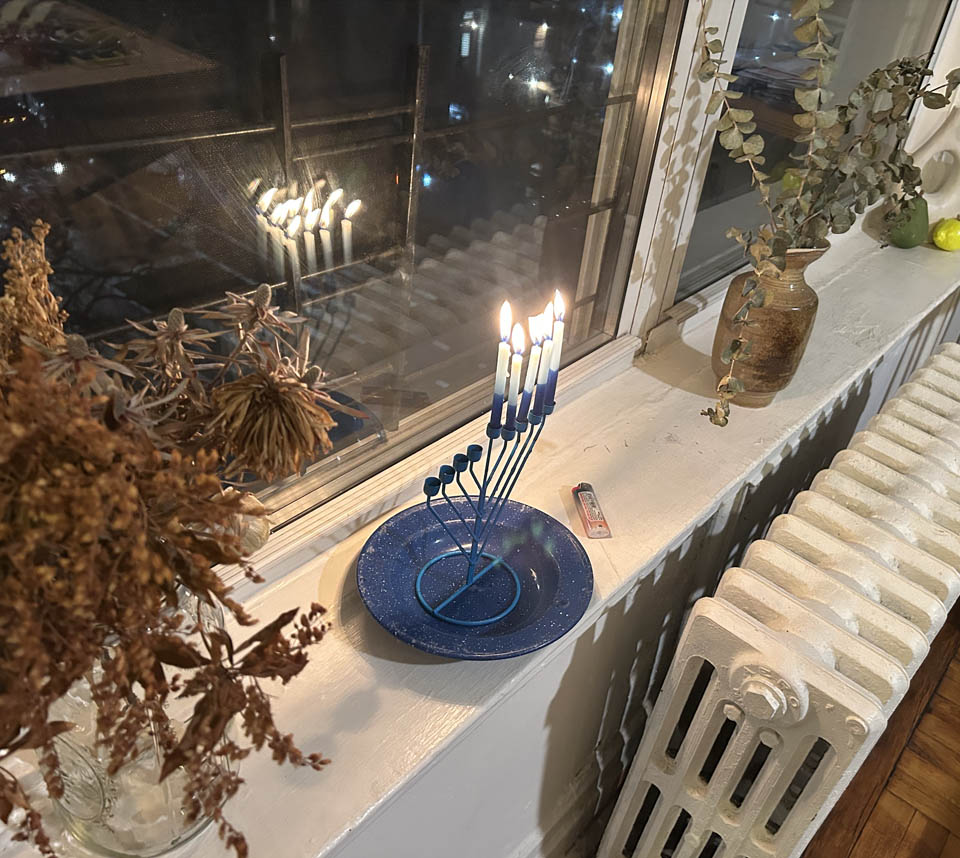We were sitting in a circle at a late point in the evening. We were together at an intimate Hanukkah party at the home of my friends Chloe and James. All the guests gathered for the first time in one conversation, satiated after eating latkes and desserts of two varieties (south Asian spices and traditional; high-end jelly donuts and re-gifted apple-crumb caramel cheesecake). The candles long lit and melted down. Two prayers recited by the two or three Jews in the room who knew them. Every “real Jew” in the room partnered with a gentile. That “realness” up for debate. Two of us with Jewish fathers (not mothers). Me: a Jewish mother and also a father who survived the Holocaust having been deemed Jewish by the Nazis due to his father’s blood, all of them, a family of practicing Catholics (he’s since, late in life, officially converted to Judaism).
Given all this dissolution, the most well-schooled Jew amongst us (raised observant and Conservative) was still somehow surprised that I had never celebrated this holiday or anything Jewish as a child. Not real, for real. These traditions, as warm as they look and feel, leave me cold. But they are food for thought, at least here on this resuscitated blog organized by a commitment to writing after every event when I enter an audience (this is my 20th since November 20th!).
Our delightful evening’s culminating circle was the only part of the Hanukkah party that felt like “an audience.” Damn … I would need to write (see Afterward below). And it was me who had made it so, asking each Jew in turn, starting with Chloe, about their relationship to this holiday, and hence their Jewishness. The goyim stayed respectfully silent: exactly half the room’s adults. Our unique versions of distance from and proximity to these prayers, blood-lines, beliefs, and families of origin took awhile to explain and also made this a definitively American Hanukkah party. Everyone listened.
Again, as was true of my first affair of this sort only a few days ago with my mother in Boulder, we did not speak of politics. However, since I have spent much of the last fifteen months in dialogue with Chloe (and others like us) about our responsibilities as Jews in this time, and I had held a meeting on this very topic (co-sponsored with another of these Jewish friends with whom I’ve been thinking, Nick)—for a group of Jews of a certain ilk (this, not self-hating) rethinking our obligations in light of the genocide and held at the bar of another party-goer, Laura (married to one of the party’s “real” Jews)—I had a strong sense of what I imagined were people’s current beliefs. I felt that we each might need to be in gentle self-loving and careful Jewish community at this time: eating and drinking, speaking of food, and work, and past parties, and our aging parents rather than the extreme destruction of American weapons and the actual suffering of hungry children.
An audience might be found or made anywhere that one becomes two or more (and we all, at the intimate Hanukkah party, agreed that Chloe’s Jewish Dad’s theory, that every group=fascism, was false and cynical). But size is only one of several preconditions for the many modes of being fed by audiences I am coming to understand through this practice; audiences we will need even more soon enough.
A party becomes an audience through a shared focus on something bigger than the individual, or even the intense connection of two, through a set of processes to guide our attention and connection. Why we so often need a piece of art or a sermon, some food or a shared problem, a person or a lecture, to make that vital shift.
And just so, while in this focused circle, listening to our late night Hanukkah connections, the most observant Jew shared with us a charming and strange Christmas tradition. All members of her Jewish family (and their partners and offspring) give a lecture when they gather on this most Christian of days. Each is allowed 10 minutes to impart wisdom, and receive an audience’s attention, so different from how families (and people at parties) typically converse—about the weather, sports, the news, food, travels; the tides of connection moving in and out but never exactly elevating or coalescing or sharpening with shared intention. We learned that the most observant Jew at our Hanukkah party would use her Christmas lecture to impart real information about her life to her family who otherwise just wouldn’t or couldn’t hear.
The audience as attentive and loving and captive witness.
The audience, a group that helps to bear the dark.


Afterward: Just yesterday, when I knew I was going to go to a second indie feature at a NYC art house in as many days (Almadovar’s, The Room Next Door, not playing in Brooklyn, sigh, but at the Angelika), and a 2nd candlelighting in the same week, I was worried about how much more I could wring from those sponges, having already blogged so recently about similar affairs. And I was hoping I might just give myself a pass from this labor- and intellect-heavy process. 2nd time could be a charm! A no-blog day.
Until now, this antiquated and in-depth practice has felt as sustaining as the many audiences I have joined, seeking solace, wisdom, and warmth in these dark times; helping me to be present, attentive, thoughtful, and respectful in this strange in-between when it would be as easy to hibernate or isolate. Home late from the party last night, I awoke this morning having dreamed anxiously about the commitment to blog about both audiences. But, with the sustained attention of my boyfriend, Gavin, focusing on the wisdom of this small but tender crowd—partner as loving and captive witness; party with a purpose—more thoughts came to light; different and wondrous charms to share here, and behold.
Comments
3 responses to “festival of lights: 2nd time’s a charm”
[…] like and unlike my own intellectual Jewish clan in Boulder, CO; my third matinee audience of the season, albeit not at an art cinema house). I was greeted with a different sort of holiday cheer: a […]
[…] so, given that you’re right here, and that I had written that being in an intimate audience with one person is another form of community and sustenance, you are my first conversational interlocutor in this […]
[…] of fun because inadvertently, I was part of the first phase of the project because you came to my Hanukkah party. We had a conversation then about whether or not we would constitute “an audience.” And then […]